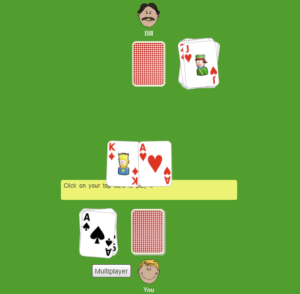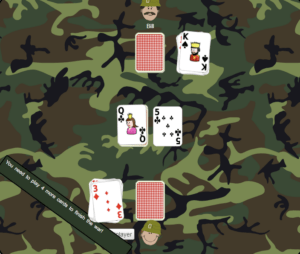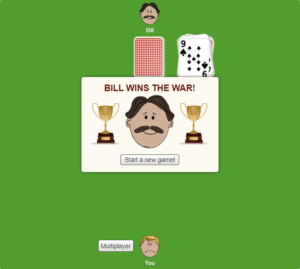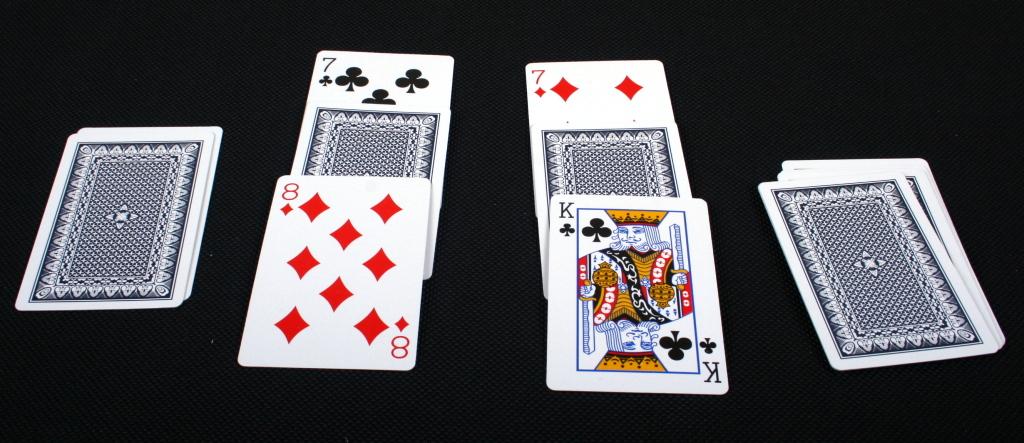War is a simple card game intended for two players, that relies purely on chance to determine the game’s outcome. Although its exact origins are unknown, War’s history dates back to centuries ago in Europe, and became popularized in England and the United States in the 19th century. Although this game is primarily played in person with a standard deck of cards, websites exist that host this game for players to play with one another, such as https://cardgames.io/war/. Each player is dealt half a deck of cards and players put down one card at a time from the top of their cards. The “higher” card wins, meaning that this player takes both cards. In the case that both players put down the same valued card, the players go to “war”, where players put 3 cards face down and the last card face up; whoever’s card is higher takes all the cards that have been put down. The player who runs out of cards first loses the game. Ultimately, War is a game that is constructed on consecutive rounds that rely on complete randomness for its outcomes, and its game mechanics that rely solely on chance can create “near miss” effects and a lack of control and randomness that may fuel addiction.
War’s game mechanic of directly comparing the card value of each players’ respective deck can create a “near miss” effect that can prompt further play, which might spiral into addiction. As referenced in the reading, War distorts players’ perception of losses, where a “near miss” effect is created that can falsely signal to players that they are close to winning. As seen below, occasionally, the cards that contend in the middle are very close to each other, such as a King and an Ace.

Because the cards are consecutive in terms of value, this gives players the illusion that they were close to winning, if the round did not play out in their favor. Probabilistically, the round was not “close”; the cards were merely an assortment of random chance that happened to create cards that were close in value. However, as mentioned in this week’s reading, this “near miss” effect may prompt further play, where players will immediately attempt to play again to achieve the win. In a game like War, which is based purely on chance where rounds do not rely on the history of previous rounds, continually playing will not increasing a player’s chance of winning a round, but this near miss effect may create consistent, repetitive play, which can spiral into addiction.
Similarly, War’s mechanic where each round’s outcome is independent of the previous rounds and is completely reliant on chance may lead to persistent unpredictability and excitement that may fuel addiction. As mentioned above, each round in War consists of contesting the values of the cards at the top of each deck. Even the “war” round is based completely on luck, where the outcome of the round depends on the fifth card in each deck, as seen below.

Because every card draw in War is completely random and each trial is independent of the other, player’s have a lack of control in the game outcome, which is completely unpredictable. Hence, this constant randomness means that probabilities are reset with every draw, which maintains a persistent unpredictability which can be both compelling and addictive. In addition, a form of anticipation is created by the complete randomness as players hope for favorable outcomes of the game without any ability to directly influence them. In addition, there is potential for upturns in the game due to this chance. For example, in the game outcome below, I was initially winning by a great amount of cards, but a 3-consequetive war round that my opponent won completely turned the game around and led to me losing.

Hence, this complete unpredictability and potential to turn the game around at any point can be highly compelling and addictive, and players might try to play more and more rounds until they get a winning round. Hence, the randomness in War can create an addictive cycle due to the lack of player input and skill.
Compared to other chance-based games, War is distinguishable due to its complete reliance on chance and leveraging of player competition. In other chance-based card games, such as Poker or Blackjack, some level of player strategy is required in order to win the game. There is significant strategy and decision-making in these games, in contrast to War, which does not utilize any sort of skill or strategy. Instead, players rely only on chance to win the game. In addition, although games such as slot games purely on chance as well, slot games are individual, rather than competitive. Hence, War is unique in that it introduces competition between players, but while completely relying on chance to determine the game’ outcome.
Ultimately, War is a game that relies completely on chance to determine its outcome, which introduces a near miss effect and unpredictability that may result in putting people at risk for addiction.




